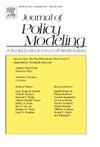财政立场对欧洲央行货币政策的作用
IF 3.1
2区 经济学
Q1 ECONOMICS
引用次数: 0
摘要
本文旨在确定欧元区财政政策与欧洲央行货币政策之间是否存在关键联系。为此,我们采用了广义矩法的厚模型方法来估计欧洲央行从 2001 年到 2022 年有无预计财政赤字指标的反应函数。结果显示,欧洲央行的行动表现出了稳定货币政策的理想效果,而预计财政赤字在解释欧洲央行的货币政策立场方面通常没有统计意义。然而,财政赤字系数的符号为正,这意味着货币政策对财政政策具有反周期性。这种效应自 2012 年以来变得更加明显,表明欧洲央行可能考虑到欧元区的财政赤字为潜在的通胀风险提供了一些迹象。总体而言,这些研究结果与欧元区普遍存在的财政主导或财政压制制度不符。本文章由计算机程序翻译,如有差异,请以英文原文为准。
Fiscal stance role for ECB monetary policy
The objective of this paper is to ascertain the presence of a crucial connection between euro area fiscal stance and ECB monetary policy. To achieve this, we employ the thick modelling approach for the Generalised method of moments to estimate ECB reaction functions with and without a projected fiscal deficit indicator from 2001 until 2022. The results reveal that the actions of the ECB have exhibited desirable effects of stabilising monetary policy, while the projected fiscal deficit was usually not statistically significant in explaining the ECB’s monetary policy stance. However, the sign of fiscal deficit coefficient was positive, implying a counter-cyclical nature of monetary policy with respect to the fiscal stance. This effect has become more evident since 2012, suggesting that the ECB might be taking into account euro area fiscal deficits as providing some indications for potential inflationary risks. Overall, these findings speak against the fiscal dominance or repression regime being prevalent in the euro area.
求助全文
通过发布文献求助,成功后即可免费获取论文全文。
去求助
来源期刊

Journal of Policy Modeling
ECONOMICS-
CiteScore
6.20
自引率
11.40%
发文量
76
期刊介绍:
The Journal of Policy Modeling is published by Elsevier for the Society for Policy Modeling to provide a forum for analysis and debate concerning international policy issues. The journal addresses questions of critical import to the world community as a whole, and it focuses upon the economic, social, and political interdependencies between national and regional systems. This implies concern with international policies for the promotion of a better life for all human beings and, therefore, concentrates on improved methodological underpinnings for dealing with these problems.
 求助内容:
求助内容: 应助结果提醒方式:
应助结果提醒方式:


